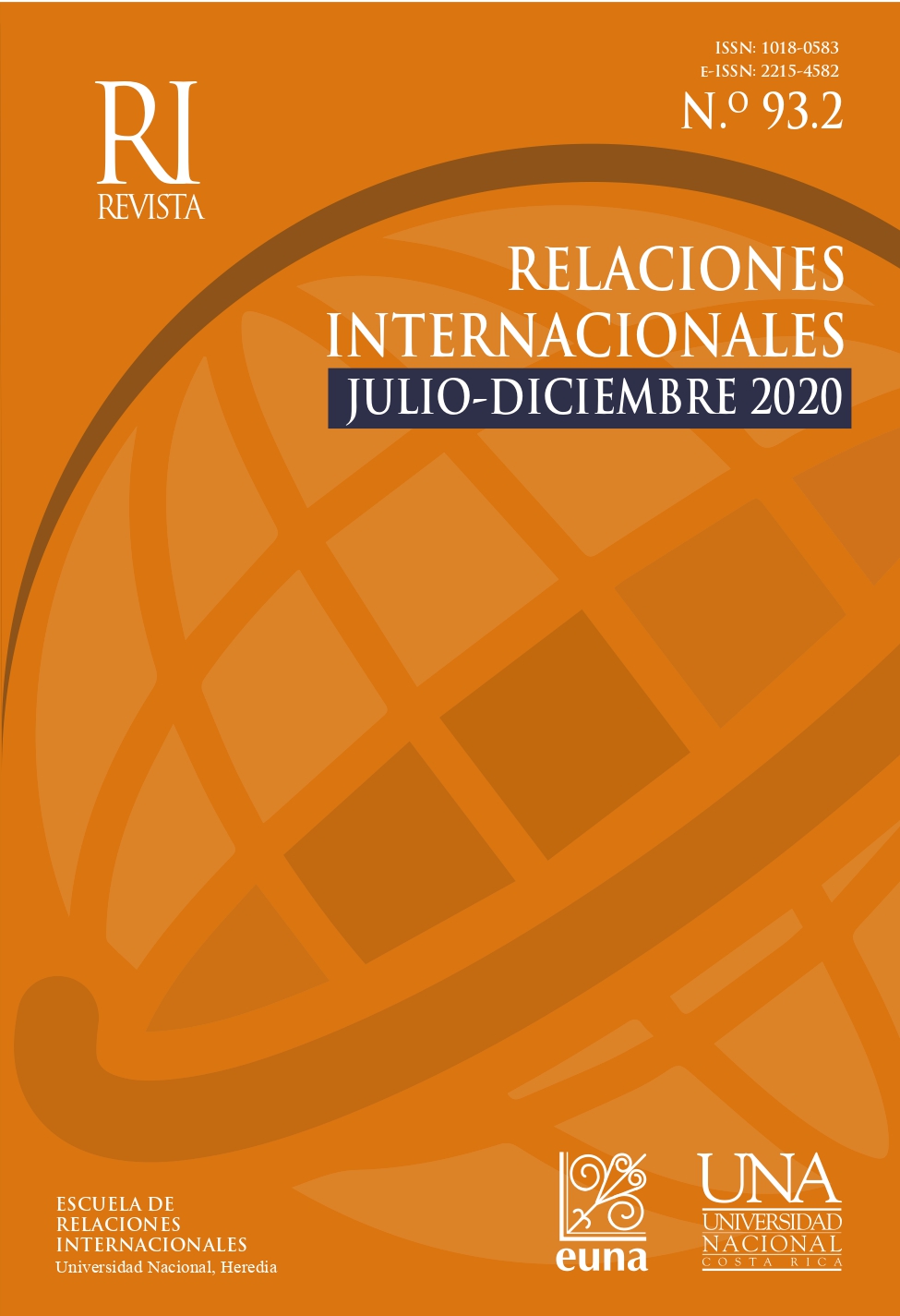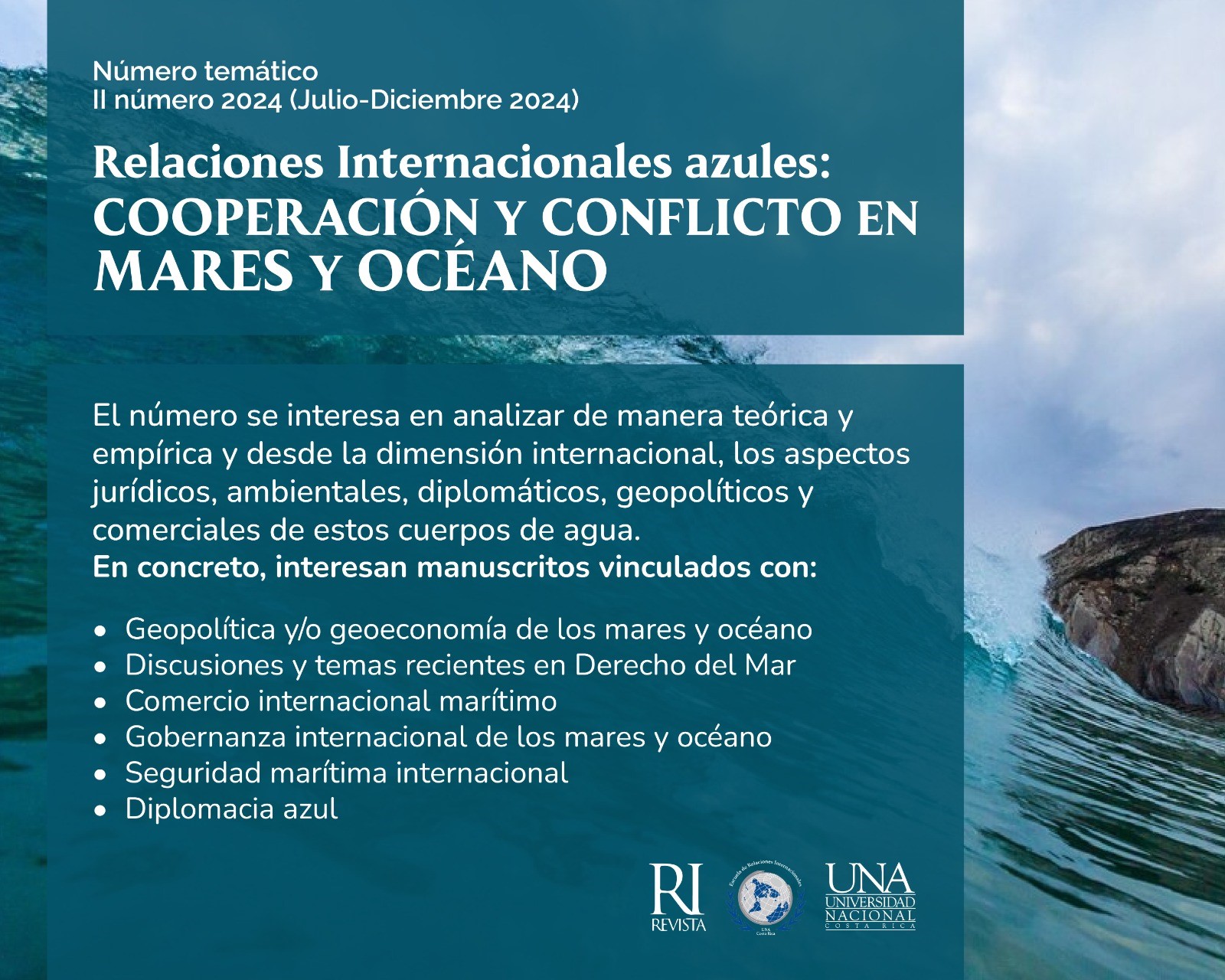China y la (no) promoción de la autocracia: Aportes al debate sobre democracia y autoritarismo en el orden internacional
DOI:
https://doi.org/10.15359/ri.93-2.5Palabras clave:
China, promoción de la autocracia, democracia, autoritarismoResumen
Actualmente no existe consenso con respecto a las razones que explican la tercera ola de autocratización. Sin embargo, las explicaciones que priorizan factores internacionales para comprender fenómenos domésticos son cada vez más relevantes y difíciles de evitar. La bibliografía que se centra en cómo aspectos externos impactan en regímenes domésticos incluye trabajos clásicos, que han observado el rol de los organismos internacionales e investigaciones más recientes que consideran el rol de poderes regionales autocráticos. Por las características de su régimen, China no ha escapado a la literatura sobre promoción de autocracia. Pese a ello hay poca evidencia de que China afecte o tenga la intención de modificar la organización política interna de otros países. El objetivo de este artículo es debatir sobre el rol de China como posible (o no) promotor y difusor de autocracia. Para ello se realizará un análisis crítico de textos sobre esta temática y de las investigaciones que se han centrado en China. El análisis de este caso permitirá observar las complejidades del debate sobre promoción de autocracia y los mecanismos causales mediante los cuales los actores internacionales podrían incidir en un cambio de régimen político. Con base en el estudio sobre China se propone un marco para una compresión más precisa e integral sobre cómo los factores externos pueden influir sobre la tercera ola de autocratización.
Referencias
Allison, R. (2018). Protective Integration and Security Policy Coordination: Comparing the SCO and CSTO. The Chinese Journal of International Politics, 11(3), 297–338.
Ambrosio, T. (2008). Catching the ‘Shanghai Spirit’: How the Shanghai Cooperation Organization Promotes Authoritarian Norms in Central Asia. Europe-Asia Studies, 60(8), 1321–1344.
Ambrosio, T. (2009). Authoritarian Backlash: Russian Resistance to Democratization in the Former Soviet Union. Routledge.
Ambrosio, Thomas. (2010). Constructing a Framework of Authoritarian Diffusion: Concepts, Dynamics, and Future Research. International Studies Perspectives, 11(4), 375–392.
Ambrosio, T. (2012). The Rise of the ‘China Model’ and ‘Beijing Consensus’: Evidence of Authoritarian Diffusion? Contemporary Politics, 18(4), 381–99.
Bader, J. (2014). China’s Foreign Relations and the Survival of Autocracies. Routledge.
Bader, J. (2015). China’s Foreign Relations and the Survival of Autocracies. Routledge. https://books.google.com.uy/books?id=YtdsMAEACAAJ.
Bader, J. (2015a). China, Autocratic Patron? An Empirical Investigation of China as a Factor in Autocratic Survival. International Studies Quarterly, 59(1), 23–33.
Bader, J. (2015b). Propping up Dictators? Economic Cooperation from China and Its Impact on Authoritarian Persistence in Party and Non-Party Regimes. European Journal of Political Research, 54(4).
Bader, J. (2015c). The Political Economy of External Exploitation. A Comparative Investigation of China’s Foreign Relations. Democratization, 22(1), 1–21.
Bader, J., Grävingholt,J. y Kästner, A. (2010). Would Autocracies Promote Autocracy? A Political Economy Perspective on Regime-Type Export in Regional Neighborhoods. Contemporary Politics, 16(1), 81–100.
Börzel, T. A. (2015). The Noble West and the Dirty Rest? Western Democracy Promoters and Illiberal Regional Powers. Democratization: Democracy Promotion and the Challenges of Illiberal Regional Powers, 22(3), 519–35.
Börzel, T. A, and Risse-Kappen, T. (2016). The Oxford Handbook of Comparative Regionalism. Oxford University Press.
Brand, A.; Mcewen-Fial, S. and Wolfgang Muno. W. (2015). An ‘Authoritarian Nexus’? China’s Alleged Special Relationship with Autocratic States in Latin America. Revista Europea de Estudios Latinoamericanos y del Caribe, 99(99), 7–28.
Burnell, P., and Schlumberger, O. (2010). Promoting Democracy - Promoting Autocracy? International Politics and National Political Regimes. Contemporary Politics: promoting democracy - promoting autocracy? International politics and national political regimes, 16(1), 1–15.
Chen, D., and Kinzelbach, K. (2015). Democracy Promotion and China: Blocker or Bystander? Democratization: Democracy Promotion and the Challenges of Illiberal Regional Powers, 22(3), 400–418.
Christensen, T. J. (2006). Fostering Stability or Creating a Monster? The Rise of China and U.S. Policy toward East Asia. International Security, 31(1), 81–126.
Diamond, L. (2008). The Democratic Rollback: The Resurgence of the Predatory State. Foreign Affairs, 87(2), 36–48.
Friedberg, A. L. (2005). The Future of U.S-China Relations - Is Conflict Inevitable ? International Security, 30(2).
Gleditsch, K.S., and D Ward, M. (2006). Diffusion and the International Context of Democratization. International Organization, 60(4), 911–33.
Hackenesch, C. (2015). Not as Bad as It Seems: EU and US Democracy Promotion Faces China in Africa. Democratization: Democracy Promotion and the Challenges of Illiberal Regional Powers - Guest Editors: Nelli Babayan & Thomas Risse, 22(3), 419–37.
Halper, S. (2010). The Beijing Consensus: How China’s Authoritarian Model Will Dominate the Twenty-First Century. Basic Goods. https://books.google.com.uy/books?id=lGpyTbC_rGIC.
Huntington, S. P. (1991). The Third Wave: Democratizacion in the Late Twentieth Century. Norman University of Oklahoma Press.
Kagan, R.. (2007). End of Dreams, Return of History. Policy review, 14.
Kneuer, M., and Demmelhuber, T. (2016). Gravity Centres of Authoritarian Rule: A Conceptual Approach. Democratization, 23(5), 775–96.
Kurlantzick, J. (2007). Charm Offensive: How China’s Soft Power Is Transforming the World Charm Offensive: How China’s Soft Power Is Transforming the World. Yale University Press.
Levitsky, S, and L A Way. (2010). Competitive Authoritarianism: Hybrid Regimes after the Cold War. Cambridge University Press
Levitsky, S. and Way, L. (2015). THE MYTH OF DEMOCRATIC RECESSION. Journal of Democracy, 26(1), 45–58.
Lipset, S.M. (1960). Political Man: The Social Bases of Politics. Bombay Vakils Feffer and Simons Private.
Lührmann, A, and Lindberg, S. (2019). A Third Wave of Autocratization Is Here: What Is New about It? Democratization, 26(7), 1095–1113.
Mearsheimer, J. J. (2010). The Gathering Storm: China’s Challenge to US Power in Asia. The Chinese Journal of International Politics, 3(4), 381–96.
Melnykovska, I; Plamper, H; and Schweickert, R. (2012). Do Russia and China Promote Autocracy in Central Asia? Studies on Common Policy Challenges, 10(1), 75–89.
Nathan, A. (2015). CHINA’S CHALLENGE. Journal of Democracy, 26(1), 157–70.
Obydenkova, A. V., and Libman, A. (2019). Authoritarian Regionalism in the World of International Organizations: Global Perspectives and the Eurasian Enigma. Oxford University Press.
Pevehouse, J. C. (2002). With a Little Help from My Friends? Regional Organizations and the Consolidation of Democracy. American Journal of Political Science, 46(3), 611–26.
Pevehouse, J. C. (2005). Democracy from above: Regional Organizations and Democratization. Cambridge University Press.
Pillsbury, M.. (2015). The Hundred-Year Marathon: China’s Secret Strategy to Replace America as the Global Superpower. Henry Holt.
Przeworski, A; Álvarez, M., Cheibub, J.; and Limongi, F. (May, 2000). Democracy and Development, 635–43. http://ebooks.cambridge.org/ref/id/CBO9780511804946.
Risse, T. and Babayan, N. (2015). Democracy Promotion and the Challenges of Illiberal Regional Powers: Introduction to the Special Issue. Democratization: Democracy Promotion and the Challenges of Illiberal Regional Powers - Guest Editors: Nelli Babayan & Thomas Risse, 22(3), 381–99.
Rueschemeyer, D. (1992). Capitalist Development and Democracy (Eds. Evelyne Huber Stephens and John D Stephens). Chicago University of Chicago Press.
Schmitter, P. (1986). An Introduction to Southern European Transitions from Authoritarian Rule: Italy, Greece, Portugal, Spain and Turkey. In Guillermo O’Donnell, Philippe Schmitter, and Laurence Whitehead (Eds.), Transitions from Authoritarian Rule: Comparative Perspectives1. Johns Hopkins University Press.
Sharshenova, A., and Crawford, G. (2017). Undermining Western Democracy Promotion in Central Asia: China’s Countervailing Influences, Powers and Impact. Central Asian Survey, 36(4), 453–72.
Söderbaum, F. (2004). The Political Economy of Regionalism. The Case of Southern Africa. Springer
Soest, C. (2015). Democracy Prevention: The International Collaboration of Authoritarian Regimes. European Journal of Political Research, 54(4), 623–38.
Tansey, O. (2016). The Problem with Autocracy Promotion. Democratization, 23(1), 141–63.
Tansey, O.; Koehler, K.; and Schmotz, A. (2017). Ties to the Rest: Autocratic Linkages and Regime Survival. Comparative Political Studies, 50(9), 1221–54.
Tolstrup, J. (2009). Studying a Negative External Actor: Russia’s Management of Stability and Instability in the ‘Near Abroad.’ Democratization, 16(5), 922–44.
Tolstrup, J. (2015a). Black Knights and Elections in Authoritarian Regimes: Why and How Russia Supports Authoritarian Incumbents in Post-Soviet States. European Journal of Political Research, 54(4), 673–90.
Tolstrup, J. (2015b). Problems in Studying the International Dimension of Authoritarianism. APSA-CD Newsletter, 8–11.
V-Dem Institute. (2020). Democracy Report 2020. Autocratization Surges – Resistance Grows. https://www.v-dem.net/en/publications/democracy-reports/.
Vanderhill, R. (2013). Promoting Authoritarianism Abroad. Lynne Rienner Publishers.
Way, L. (2016). Weaknesses of Autocracy Promotion. Journal of Democracy, 27(1), 64–75.
Whitehead, L. (1986). International Aspects of Democratization. In Guillermo O’Donnell, Fhilippe Schmitter, and Laurence Whitehead (Eds.), Transitions from Authoritarian Rule: Comparative Perspectives. Johns Hopkins University Press.
Whitehead, L. (1996). The International Dimensions of Democratization: Europe and the Americas. New York Oxford University Press.
Yakouchyk, K. (2016). The Good, the Bad, and the Ambitious: Democracy and Autocracy Promoters Competing in Belarus. European Political Science Review: EPSR, 8(2), 195–224.
Yakouchyk, K. (2019). Beyond Autocracy Promotion: A Review. Political Studies Review, 17(2), 147–60.
Publicado
Cómo citar
Número
Sección
Licencia
Esta publicación está adscrita a Creative Commons; deben respetarse sus atribuciones y restricciones.
Los autores/as que publiquen en esta revista aceptan las siguientes condiciones:
- Los autores/as conservan los derechos de autor y ceden a la revista el derecho de la primera publicación, con el trabajo registrado con la Licencia Creative Commons Atribución-NoComercial-CompartirIgual 4.0 Internacional, que permite a terceros utilizar lo publicado siempre que mencionen la autoría del trabajo y a la primera publicación en esta revista.
- Los autores/as pueden realizar otros acuerdos contractuales independientes y adicionales para la distribución no exclusiva de la versión del artículo publicado en esta revista (p. ej., incluirlo en un repositorio institucional o publicarlo en un libro) siempre que indiquen claramente que el trabajo se publicó por primera vez en esta revista.
- Se permite y recomienda a los autores/as a publicar su trabajo en Internet (por ejemplo en páginas institucionales o personales) antes y durante el proceso de revisión y publicación, ya que puede conducir a intercambios productivos y a una mayor y más rápida difusión del trabajo publicado.
Revista de Relaciones Internacionales por Universidad Nacional de Costa Rica está bajo una Licencia Creative Commons Atribución-NoComercial-SinDerivar 4.0 Internacional









.png)



2.png)
